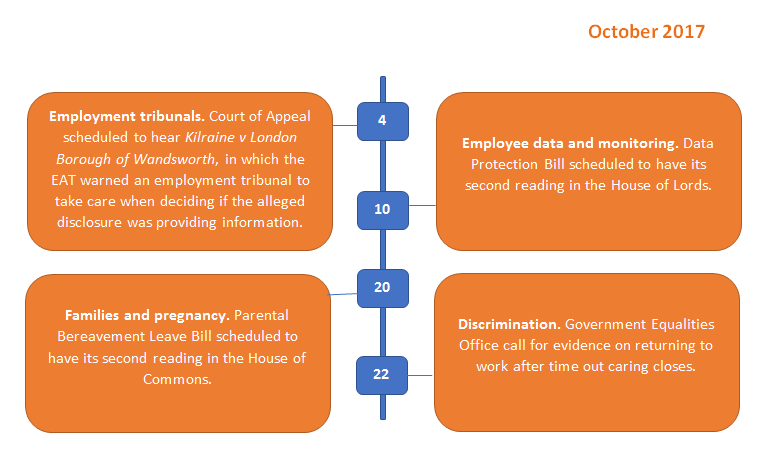Discrimination. Advocate General Sharpston has given her view that the Pregnant Workers Directive (92/85/EC) should protect workers against dismissal from the moment they become pregnant, even before they have notified their employer of the pregnancy. This appears to be at odds with Article 2(a) of the Pregnant Workers Directive, and as the AG acknowledges, can be unfair to employers. In the UK, the general view is that a woman has no special protection until her employer is aware that she is pregnant. The ECJ’s decision on this issue is therefore awaited with interest.
The Presidents of the Employment Tribunals have issued joint guidance on injury of feelings compensation in discrimination cases, setting out new Vento bands. There is now a lower band of £800 to £8,400, a middle band of £8,400 to £25,200 and an upper band of £25,200 to £42,000.
Employee data and monitoring. The Grand Chamber of the European Court of Human Rights has reversed an earlier ruling, and held that the Romanian courts had failed to protect an employee’s Article 8 privacy rights in relation to the employer’s monitoring of his instant messaging The court sets out factors to be considered when assessing the monitoring of workplace communications.
The Data Protection Bill had its first reading in the House of Lords on 13 September 2017. The second reading debate is scheduled for 10 October 2017. The Bill will repeal and replace the Data Protection Act 1998 and supplement the General Data Protection Regulation which will be directly applicable from 25 May 2018. The ICO is consulting on draft guidance on contracts and liabilities under the GDPR.
Meanwhile, magistrates have fined a former council employee for data protection breaches of the when he sent personal data about 349 council service users to his personal email account.
Equal pay. The EAT upheld a tribunal’s decision that a predominantly female group of Asda retail employees can compare themselves with a mainly male group of distribution depot employees for the purposes of an equal value claim. Asda have appealed to the Court of Appeal.
Cross Border. The ECJ has ruled that an exclusive choice of forum clause in Ryanair cabin crew contracts of employment was unenforceable under the 2001 Brussels Regulation. The clause purported to confer exclusive jurisdiction on the Irish courts. The ECJ held that the “place where the employee habitually carries out his work” under the Brussels Regulation is the place where, or from which, the worker performs the essential part of their duties on behalf of their employer. The location of the crew-member’s “home base” (in this case, Paris) was likely to be a significant factor but not determinative.
Unions. The National Assembly for Wales passed the Trade Union (Wales) Act 2017, which came into force on 13 September 2017. The Act excludes certain provisions of the Trade Union Act 2016 from applying to devolved Welsh authorities. In the High Court, Thomas Cook has been refused an injunction to prevent industrial action by BALPA. The court ruled that ballot papers do not have to specify the dates on which industrial action would take place, beyond specifying a period (in this case, a period of five months) within which it was expected to take place.
In other news, research undertaken by the commercial law firm EMW showed that only 8,700 employees took shared parental leave last year, zero hours contracts fell to their lowest rate in 3 years, around £10 million in illegal working fines were issued in the first quarter of 2017, the NHS has been urged to ban “exploitative” umbrella companies and Acas has called for an attitude change towards flexible work. A tribunal has held that Addison Lee drivers are workers not self-employed, the week Uber’s appeal over the employment status of its drivers was heard in the EAT. Meanwhile, the Gangmasters and Labour Abuse Authority (GLAA) has hired an additional 50 investigators and reports a huge surge in its caseload.
In our blog, Emma Morgan considered whether employers can refuse to employ non-British EU nationals, Nick Singer looked at whistleblowing in relation to pensions auto-enrolment and Katherine Apps examined the impact the recent rulings on voluntary overtime and holiday pay in relation to those on zero hours contracts.
Next month
Key developments to look out for in October 2017.

How to stay up to date
Practical Law Employment has a number of tools to help keep you updated on anticipated developments in employment law:
- What to expect in employment law has details of forthcoming legislative and case law developments.
- Employment legislation tracker contains information on the progress of government consultations, bills and legislation.
- Case tracker tracks key forthcoming cases and recent judgments currently making their way through the courts.
- Key dates calendar enables you to browse by month or search by what’s coming up by date range.



